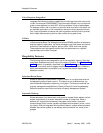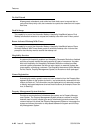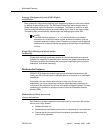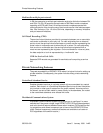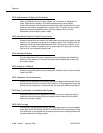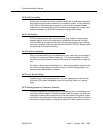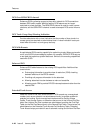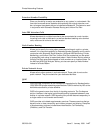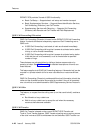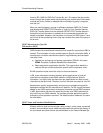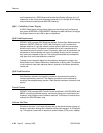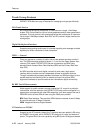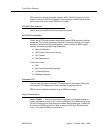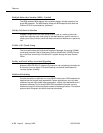
Private Networking Features
Issue 5 January 1998
A-47555-230-024
Extension Number Portability
Gives you the ability to assign any extension to any system in a subnetwork. Sta-
tions can be moved across systems while retaining the original extension num-
ber, as long as the systems are part of a defined subnetwork. This feature is used
in conjunction with Automatic Alternate Routing and Uniform Dial Plan.
Inter-PBX Attendant Calls
Allows attendants for multiple branches to be concentrated at a main location.
Incoming trunk calls to the branch, as well as attendant-seeking voice-terminal
calls, route over tie trunks to the main location.
Node Number Routing
Allows you to specify the route pattern associated with each node in a private
network. It is a required capability for Extension Number Portability and is used in
conjunction with Automatic Route Selection, AAR and ARS Partitioning, Private
Networking, and Uniform Dial Plan. Uniform Dial Plan extensions can be routed
to a specified node using its associated pattern. Node Number Routing allows a
Uniform Dial Plan route pattern based on node numbers or on location codes. On
the AAR and ARS Digit Analysis Tables, you also can specify a Node Number
instead of a Route Pattern.
Private Network Access
Allows calls to other systems in a private network. These calls do not use the
public network. They are routed over your dedicated facilities.
QSIG
QSIG provides compliance to the International Organization for Standardization
(ISO) ISDN-PRI private-networking specifications. QSIG is defined by ISO as the
worldwide standard for private networks.
QSIG is the generic name for a family of signaling protocols. The Q-reference
point or interface is the logical point where signaling is passed between 2 peer
entities in a private network. QSIG signaling can provide feature transparency in
a single-vendor or multi-vendor environment.
QSIG provides call-related supplementary services. These are services that go
beyond voice or data connectivity and number transport and display. Examples
of supplementary services include Name Identification, Call Forwarding
(Diversion), and Call Transfer.



